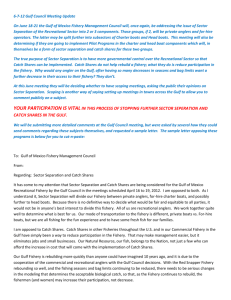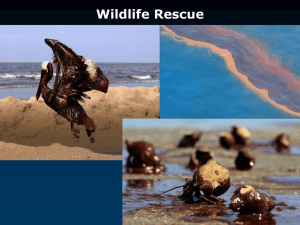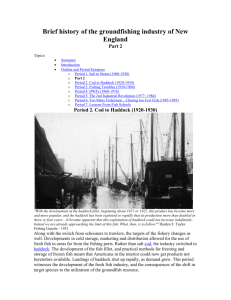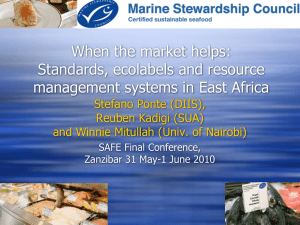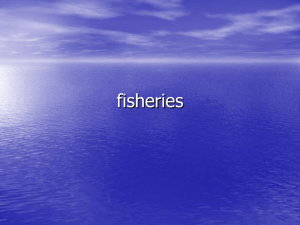8-11-12 YOU Can Help NOW to STOP Privatization of OUR Gulf
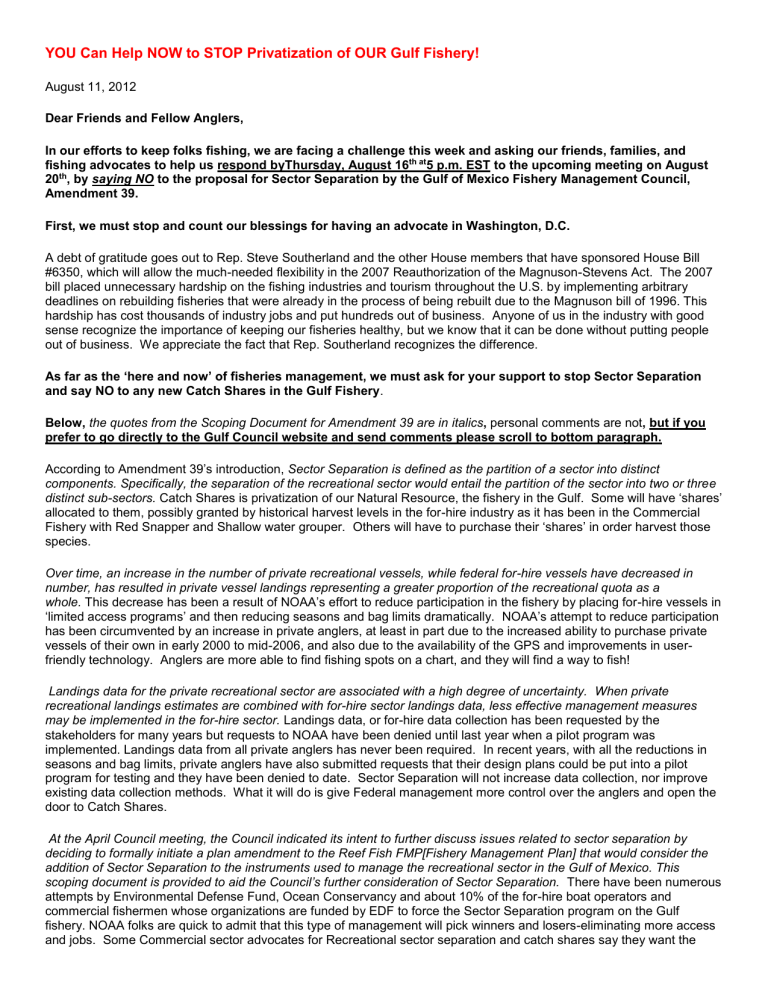
YOU Can Help NOW to STOP Privatization of OUR Gulf Fishery!
August 11, 2012
Dear Friends and Fellow Anglers,
In our efforts to keep folks fishing, we are facing a challenge this week and asking our friends, families, and fishing advocates to help us respond byThursday, August 16 th at 5 p.m. EST to the upcoming meeting on August
20 th , by saying NO to the proposal for Sector Separation by the Gulf of Mexico Fishery Management Council,
Amendment 39.
First, we must stop and count our blessings for having an advocate in Washington, D.C.
A debt of gratitude goes out to Rep. Steve Southerland and the other House members that have sponsored House Bill
#6350, which will allow the much-needed flexibility in the 2007 Reauthorization of the Magnuson-Stevens Act. The 2007 bill placed unnecessary hardship on the fishing industries and tourism throughout the U.S. by implementing arbitrary deadlines on rebuilding fisheries that were already in the process of being rebuilt due to the Magnuson bill of 1996. This hardship has cost thousands of industry jobs and put hundreds out of business. Anyone of us in the industry with good sense recognize the importance of keeping our fisheries healthy, but we know that it can be done without putting people out of business. We appreciate the fact that Rep. Southerland recognizes the difference.
As far as the ‘here and now’ of fisheries management, we must ask for your support to stop Sector Separation and say NO to any new Catch Shares in the Gulf Fishery .
Below, the quotes from the Scoping Document for Amendment 39 are in italics, personal comments are not , but if you prefer to go directly to the Gulf Council website and send comments please scroll to bottom paragraph.
According to Amendment 39’s introduction, Sector Separation is defined as the partition of a sector into distinct components. Specifically, the separation of the recreational sector would entail the partition of the sector into two or three distinct sub-sectors. Catch Shares is privatization of our Natural Resource, the fishery in the Gulf. Some will have ‘shares’ allocated to them, possibly granted by historical harvest levels in the for-hire industry as it has been in the Commercial
Fishery with Red Snapper and Shallow water grouper. Others will have to purchas e their ‘shares’ in order harvest those species.
Over time, an increase in the number of private recreational vessels, while federal for-hire vessels have decreased in number, has resulted in private vessel landings representing a greater proportion of the recreational quota as a whole. This decrease has been a result of NOAA’s effort to reduce participation in the fishery by placing for-hire vessels in
‘limited access programs’ and then reducing seasons and bag limits dramatically. NOAA’s attempt to reduce participation has been circumvented by an increase in private anglers, at least in part due to the increased ability to purchase private vessels of their own in early 2000 to mid-2006, and also due to the availability of the GPS and improvements in userfriendly technology. Anglers are more able to find fishing spots on a chart, and they will find a way to fish!
Landings data for the private recreational sector are associated with a high degree of uncertainty. When private recreational landings estimates are combined with for-hire sector landings data, less effective management measures may be implemented in the for-hire sector.
Landings data, or for-hire data collection has been requested by the stakeholders for many years but requests to NOAA have been denied until last year when a pilot program was implemented. Landings data from all private anglers has never been required. In recent years, with all the reductions in seasons and bag limits, private anglers have also submitted requests that their design plans could be put into a pilot program for testing and they have been denied to date. Sector Separation will not increase data collection, nor improve existing data collection methods. What it will do is give Federal management more control over the anglers and open the door to Catch Shares.
At the April Council meeting, the Council indicated its intent to further discuss issues related to sector separation by deciding to formally initiate a plan amendment to the Reef Fish FMP[Fishery Management Plan] that would consider the addition of Sector Separation to the instruments used to manage the recreational sector in the Gulf of Mexico. This scoping document is provided to aid the Council’s further consideration of Sector Separation.
There have been numerous attempts by Environmental Defense Fund, Ocean Conservancy and about 10% of the for-hire boat operators and commercial fishermen whose organizations are funded by EDF to force the Sector Separation program on the Gulf fishery. NOAA folks are quick to admit that this type of management will pick winners and losers-eliminating more access and jobs. Some Commercial sector advocates for Recreational sector separation and catch shares say they want the
Recreational sector to be accountable. Their organizations are also supported by EDF. I say we are as accountable as we can be under the current regulatory system. We abide by bag limits and seasons that are imposed. It is management’s fault if they do not consider all available data which they can use to improve their accuracy and prevent what they call overfishing. Their lack of usage of artificial reef data in their stock assessments severely skews the scientist’s ability to interpret the data in a way that is fair and equitable to all fishing interests. Reputable researchers’ data shows that 75% of the Red Snapper fishery exists on artificial reefs and yet are not included in the stock assessments. NOAA’s focus on limiting the number of participants in the fishery has caused funding to be taken away from the proper data collection and from the use of more appropriate modeling techniques that will take into consideration the significant growth of a rebuilding fishery, including the stocks on artificial reefs.
Under ‘ Purpose and Need’ … The need for Amendment 39 is to enable the for-hire sector to improve management of their business, reduce management uncertainty, and prevent overfishing. The need for Amendment 39 is only to appease the few who have been pushing hard to separate the Recreational sector in their efforts to promote Catch Shares. The majority of the sector cannot attend the Gulf Council meetings to voice their opinions for one reason or another, nor do most receive notice of these meetings. The recreational sector, with the exception of head-boats, has not been required to participate in data collection programs, even though many have been willing and been requesting the same for years.
Data collection for the purpose of making scientific decisions regarding regulations has nothing to do with Sector
Separation. Proper effective data collection should be of the highest priority. That is not the way it is today nor will Sector
Separation accomplish that need.
In regard to ‘Background’…To contextualize sector separation, this section provides background information on changes within the recreational sector … Overall, these data suggest an increase in recreational effort over time as well as the proportional growth in landings represented by private vessels compared with for-hire vessels . Of course it does!! More individuals are moving to the coast, buying their own boats, or relying on for-hire boats for access to the fishery. Federally permitted for-hire vessels were placed in a limited access program in 2004. By law the group was not allowed to increase! Due to the excessive regulations forced on the industry, many lost their businesses after that and their permits cancelled. If there were fewer restrictions on the for-hire industry, there would be more access for those who wish to fish but cannot afford the privilege of owning their own boat.
Under ‘ Permits and Licenses’ … State Saltwater Fishing Licenses ..Between 2000 and 2009, most Gulf States recorded increases in the annual number of saltwater fishing licenses sold… There is no limit on the number of state saltwater fishing licenses which may be sold. These increases in licenses sold attest to the fact that if anglers cannot fish on for-hire vessels in Federal waters, they will either fish on State for-hire boats or privately with friends and family boats. In addition, with fuel costs skyrocketing in recent years, anglers are cutting costs by staying in State waters.
State For-Hire Permits.. between 2000 and 2009, the number of state for-hire permits sold by Gulf States increased by
20%... There is no limit on the number of state for-hire permits which may be sold.
Federal Forhire Reef Fish Permits… Implemented in 2004, Amendment 20 to the Reef Fish FMP established a moratorium on the sale of federal for-hire reef fish permits, effectively limiting the maximum number… Between the excess Federal regulations, limited access eliminating the addition of for-hire operators, and increased fuel costs, many smaller businesses are choosing to give up their Federal permits and stay in State waters. Again, it is not due to lack of anglers wanting to go fishing, it is due to excess regulations. Regulatory actions have made participation in the industry less profitable, thus decreasing that participation. And, it is quite intentional.
Und er ‘ Scope of Actions’ … Reef Fish Amendment 39 is expected to include a wide array of actions. Potential management actions include the selection of species to be included, the number of sectors into which the recreational quota would be divided, and the allocation of quota to each new subsector… Additional actions could include establishing annual catch limits, annual catch targets, and accountability measures for the sub-sectors, as well as effort restrictions, if deemed appropriate to the new sub-sectors. As anglers we well know what all these ‘additional actions’ and ‘effort restrictions’ mean, reducing participation in the fishery… lower allocations of quota based on inadequate science, and other effort restrictions, such as allocating fish tags at a price to limit the affordability and accessibility to fish.
What we are not hearing from our fishery managers is a demand for better, more accurate science, and a need to enhance the habitat of the Gulf fisheries so it may grow to reach its full potential and meet the needs of the Nationproviding fish and fishing experiences to all who want them. With such a huge Natural asset that the Gulf of Mexico embodies, why on earth are we buying 80% of our seafood in the U.S. from foreign countries?!
In summary, Sector Separation and Catch Shares do not improve the fishery and they do not encourage building the habitat in order to meet the demands of the public on the resource. Instead, these measures will place
further limitations on the industry and on tourism which will be a detriment to the economic growth of the coastal communities that rely on access to these fisheries. For these reasons we encourage the fishing public to know, You are a stakeholderin this process and we encourage you to get involved to help stop Sector Separation in the recreational fishery in the Gulf by sending your comments by Thursday, August
16 th to : http://www.gulfcouncil.org/council_meetings/comment_forms/RF%20Amendment%2039%20-
%20Sector%20Separation.php
And also send to our Florida representatives on the Gulf Council:
Jessica.mccawley@myfwc.com
Jessica McCawley, FL Representative for the FWC pamdana@yahoo.com
Dr. Pam Dana, FL Representative for the recreational sector labele@admin.fsu.edu
Dr. Larry Abele, FL ‘At Large’ representative
Jmsanchez22@aol.com
John Sanchez, FL Representative for commercial sector
If you have further questions or comments regarding this issue, post a note on Facebook at www.Facebook.com/CaptAndersonsMarina .
Thank you from the Capt. Max Anderson family, taking folks fishing since 1935 in Bay County.
Sincerely.
Pam Anderson
Operations Manager,
Capt. Anderson's Marina
5550 N. Lagoon Drive
Panama City Beach, FL 32408
'Where the fish are always biting and the kids are always smiling' www.captandersonsmarina.com
Those who go down to the sea in ships, who do business on great waters; They have seen the works of the
LORD, and His wonders in the deep. Psalms 107:23-24
